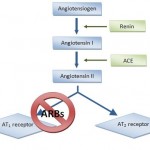 Angiotensin II Receptor Blockers (ARBs)
Angiotensin II Receptor Blockers (ARBs)
What are angiotensin receptor blockers, and how do they work?
Angiotensin II is a very potent chemical that causes muscles surrounding blood vessels to contract, thereby narrowing blood vessels. This narrowing increases the pressure within the vessels and can cause high blood pressure (hypertension). Angiotensin II receptor blockers (ARBs) are medications that block the action of angiotensin II by preventing angiotensin II from binding to angiotensin II receptors on blood vessels. As a result, blood vessels enlarge (dilate) and blood pressure is reduced. Reduced blood pressure makes it easier for the heart to pump blood and can improve heart failure. In addition, the progression of kidney disease due to high blood pressure or diabetes is slowed. ARBs have effects that are similar to angiotensin converting enzyme (ACE) inhibitors, but ACE inhibitors act by preventing the formation of angiotensin II rather than by blocking the binding of angiotensin II to muscles on blood vessels.